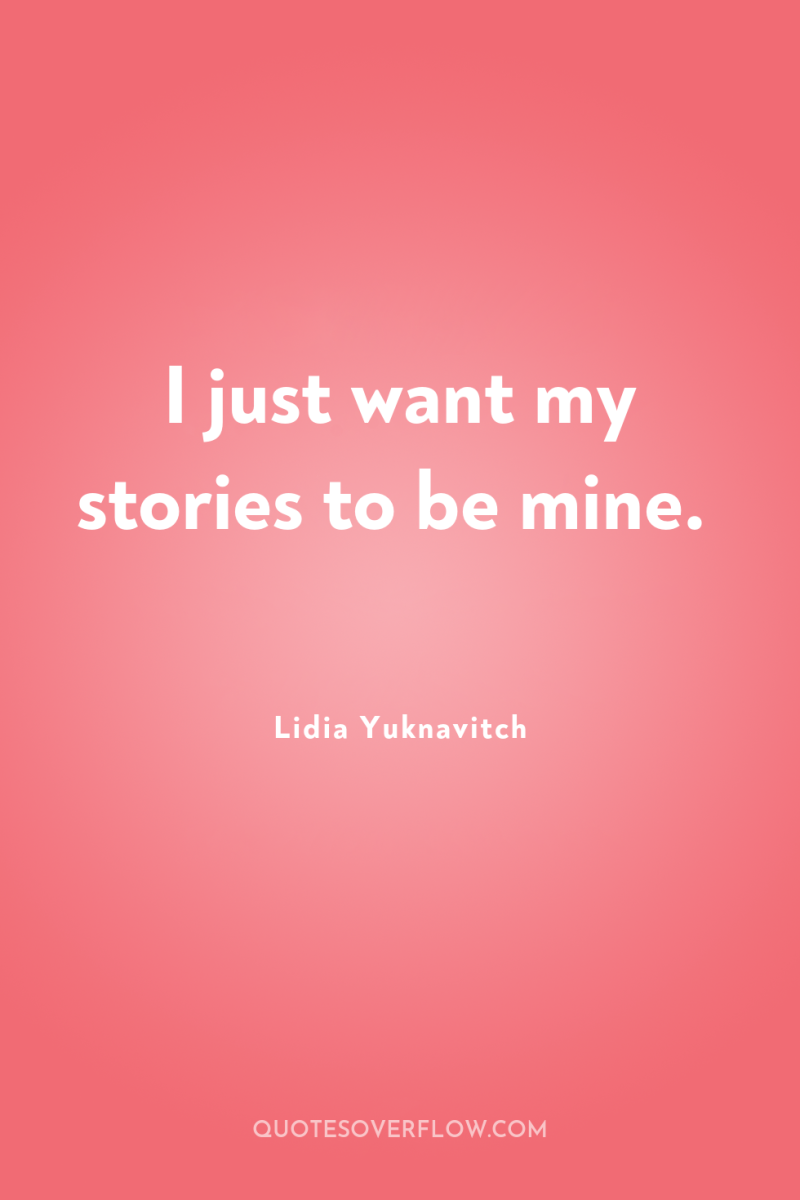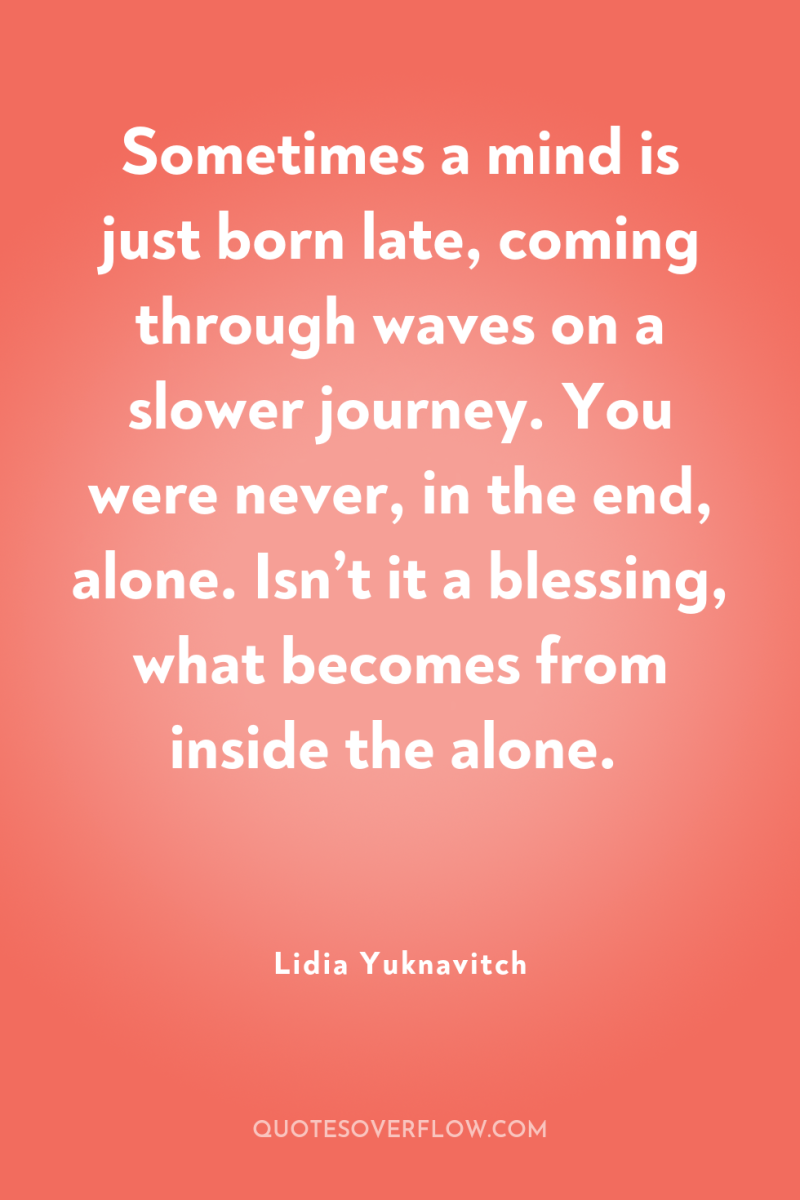
I just want my stories to be mine.Lidia Yuknavitch

I kiss her. I kiss her and kiss her. I try not to bite her lip. She tastes like vodkahoney.Lidia Yuknavitch
Leslie Marmon Silko whispers the story is long. No, longer. Longer than that even. Longer than anything. With Anne Sexton and Sylvia Plath drink at the bar. Laugh the dark laughter in the dark light. Sing a dark drunken song of men. Make a slurry toast. Rock back and forth, and drink the dark, and bask in the wallow of women knowing what women know. Just for a night. When you need to feel the ground of your life and the heart of the world, there will be a bonfire at the edge of a canyon under a night sky where Joy Harjo will sing your bonesong. Go ahead-with Anne Carson - rebuild the wreckage of a life a word at a time, ignoring grammar and the forms that keep culture humming. Make word war and have it out and settle it, scattering old meanings like hacked to pieces paper doll confetti. The lines that are left … they are awake and growling. With Virginia Woolf there will perhaps be a long walk in a garden or along a shore, perhaps a walk that will last all day. She will put her arm in yours and gaze out. At your backs will be history. In front of you, just the ordinary day, which is of course your entire life. Like language. The small backs of words. Stretching out horizonless. I am in a midnight blue room. A writing room. With a blood red desk. A room with rituals and sanctuaries. I made it for myself. It took me years. I reach down below my desk and pull up a bottle of scotch. Balvenie. 30 year. I pour myself an amber shot. I drink. Warm lips, throat. I close my eyes. I am not Virginia Woolf. But there is a line of hers that keeps me well: Arrange whatever pieces come your way. I am not alone. Whatever else there was or is, writing is with me.Lidia Yuknavitch
But more often there are regular people in the pool. Beautiful women seniors doing water aerobics - mothers and grandmothers and great grandmothers - their massive breasts and guts reminding you how it is that women carry worlds. When I swim by them I watch their legs and bodies underwater, and feel a strange kinship with a maternal lineage.Lidia Yuknavitch

Sometimes a mind is just born late, coming through waves on a slower journey. You were never, in the end, alone. Isn’t it a blessing, what becomes from inside the alone.Lidia Yuknavitch
Two things have always ruptured up and through hegemony: art and bodies.Lidia Yuknavitch
I considered quitting graduate school. I paid my ticket, I rode the ride. Right? Half the people I started with quit. I did not have to continue toward scholar. But something wouldn’t let me. Some deep wrestling match going on inside my rib house and gray matter. Some woman in me I’d never met. You know who she was? My intellect. When I opened the door and there she stood, with her sassy red reading glasses and fitted skirt and leather bookbag, I thought, who the hell are you? Crouching into a defensive posture and looking at her warily out of the corner of my eye. Watch out, woman. To which she replied, I’m Lidia. I have a desire toward language and knowledge that will blow your mind.Lidia Yuknavitch
It is possible to make family any way you like. It is possible to love men without rage. There are thousands of ways to love men.Lidia Yuknavitch
Words carry oceans on their small backs.Lidia Yuknavitch
She’s thinking about grief and trauma, how they can hide out inside a woman, how they can come back. The playwright follows her eyes, until he sees what she sees. The photographer’s framed image, the orphan girl lit up by the explosion, a girl blowing forward, a girl coming out of fire, a girl who looks as if she might blast right through image and time into the world“ I know what’s happened, ” the poet says.Lidia Yuknavitch
What she thinks and feels is this: This is a world of men. They come into your country, they invade your home, they kill your family. They turn your body into the battlefield – the territory of all violence – all power – all life and death. And we take it. We do. We keep taking it. We have lost track of the reasons we do not slaughter the world of men, but we do not. Yes, there are good men. She sees the face of her father. She sees how the filmmaker loves the writer. She sees the yet-unwritten life of the writer’s son. She sees her. brother. Beautiful smear. But it is the world of men that creates pure destruction. And this is a truth we cannot bear: Since we bear them into the world, we cannot kill them. Cannot be done with them. Cannot exile them into oblivion.Lidia Yuknavitch
We are all swimmers before the dawn of oxygen and earth. We all carry the memory of that breathable blue past.Lidia Yuknavitch
You see it is important to understand how damaged people don’t always know how to say yes, or to choose the big thing, even when it is right in front of them. It’s a shame we carry. The shame of wanting something good. The shame of feeling something good. The shame of not believing we deserve to stand in the same room in the same way as all those we admire. Big red As on our chests. I never thought to myself growing up, be a lawyer. An astronaut. The President. A scientist. A doctor. An architect. I didn’t even think, be a writer. Aspiration gets stuck in some people. It’s difficult to think yes. Or up. When all you feel is fight or run.Lidia Yuknavitch
Fourteen, fifteen, sixteen, seventeen, lemme tell you. Those are big years. Everybody always thinks of it as a time of adolescence–just getting through to the real part of your life–but it's more than that. Sometimes your whole life happens in those years, and the rest of your life it's just the same story playing out with different characters. I could die tomorrow and have lived the main ups and downs of life. Pain. Loss. Love. And what you all so fondly refer to as wisdom. Wanna know the difference between adult wisdom and young adult wisdom? You have the ability to look back at your past and interpret it. I have the ability to look at my present and live it with my whole body.Lidia Yuknavitch
Language is a metaphor for experience. It’s as arbitrary as the mass of chaotic images we call memory—but we can put it into lines to narrativize over fear.Lidia Yuknavitch
Is a way for anger to come out as an energy you let loose and away. The trick is to give it a form, and not a human target. The trick is to transform rage. When I watch Andy work the heavy bag, or work his body to drop doing mixed martial arts, I see that anger can go somewhere - out and away from a body - like an energy let loose and given form. Like my junk comes out in art.Lidia Yuknavitch
There is no girl we are not always already making into a woman from the moment she is born – making a city in the dirt next to the boot of a man. It could be rage or love in his feet. The girl could be me or any other girl.Lidia Yuknavitch
One day the girl is taking a bath and calls out. The widow comes into the tiny bathroom and the water surrounding the girl’s legs is clouded with crimson. She slaps the girl in the face and smiles and kisses her on the cheeks. She says, “May you bloom.” The girl doesn’t flinch. The widow tells her, “This is the first language of your body. It is the word ne. When you bleed each month, as when the moon comes and goes in its journey, you leave the world of men. You enter the body of all women, who are connected to all of nature.” The girl asks, “Why is it the word ne?” The widow responds, “When you bleed, this word is more powerful than any word you could ever speak. It is a blood word. It binds you to animals and trees and the moon and the sun. Where men take blood in the world in hunting and war, women give blood. It is the word ne because it closes the room of a woman’s body to men.” The widow places her hands into the water and says, “Good. You are alive. You and I are alive.Lidia Yuknavitch
I drop to the curb like childhood leaving a body.Lidia Yuknavitch
I didn’t know yet how wanting to die could be a bloodsong in your body that lives with you your whole life. I didn’t know then how deeply my mother’s song had swum into my sister and into me. I didn’t know that something like wanting to die could take form in one daughter as the ability to quietly surrender, and in the other as the ability to drive into death head-on. I didn’t know we were our mother’s daughters after all. .Lidia Yuknavitch
Through the doorway to choice and hope were the saddest girls I have ever met. Not because someone beat them or because someone molested them or because they were poor or pregnant or even because they put needles in their arms or pills in their mouths or weed in their lungs or alcohol down their ever-constricting throats. They were the saddest girls I have ever met because every one of them had it in her to lose a shot at a self and become her mother.Lidia Yuknavitch
However, narrating what you remember, telling it to someone, does something else. The more a person recalls a memory, the more they change it. Each time they put it into language, it shifts. The more you describe a memory, the more likely it is that you are making a story that fits your life, resolves the past, creates a fiction you can live with. It’s what writers do. Once you open your mouth, you are moving away from the truth of things. According to neuroscience. The safest memories are locked in the brains of people who can’t remember. Their memories remain the closest replica of actual events. Underwater. Forever.Lidia Yuknavitch
Where does repressed pain and rage go in a body? Does the wound of daughter turn to something else if left unattended? Does it bloom in the belly like an anti-child, like an organic mass made of emotions that didn’t have anywhere to go? How do we name the pain of rage in a woman? Mother?Lidia Yuknavitch
My parents Oedipal fakersLidia Yuknavitch
And so, now, she runs. In her running, her mind leaves her. And she can hear nothing but her heart, the blast making her deaf. There is a great white silent empty in her running. She runs.Lidia Yuknavitch
There's a girl calm people don't know about. It's a girl teen standstill. A motionless peace. It doesn't come from anywhere but inside us, and it only lasts for a few years. It's born from being a not woman yet. It's free flowing and invisible. It's the eye of the violent storm you call my teenage daughter. In this place we are undisturbed by all the moronic things you think about us. Our voices like rain falling. We are serene. Smooth. With more perfect hair and skin than you will ever again know. Daughters of Eve. .Lidia Yuknavitch
What we need, is a break out. Out of our lives, out of Seattle, out of the dumb script of girl.Lidia Yuknavitch
Seventeen times against the wall or in the barn: You move or scream or say anything I will kill them all. In front of you. First I will torture them and then I will kill them. Her eyes as dead as she can make them. Her arms as limp as she can make them. Her heart as hidden as she can make it. A soldier’s cock entering the thin white flesh of a girl, into the small red cave of her, the fist of her heart pounding out be-dead, be-dead, be-dead. Counting.Lidia Yuknavitch